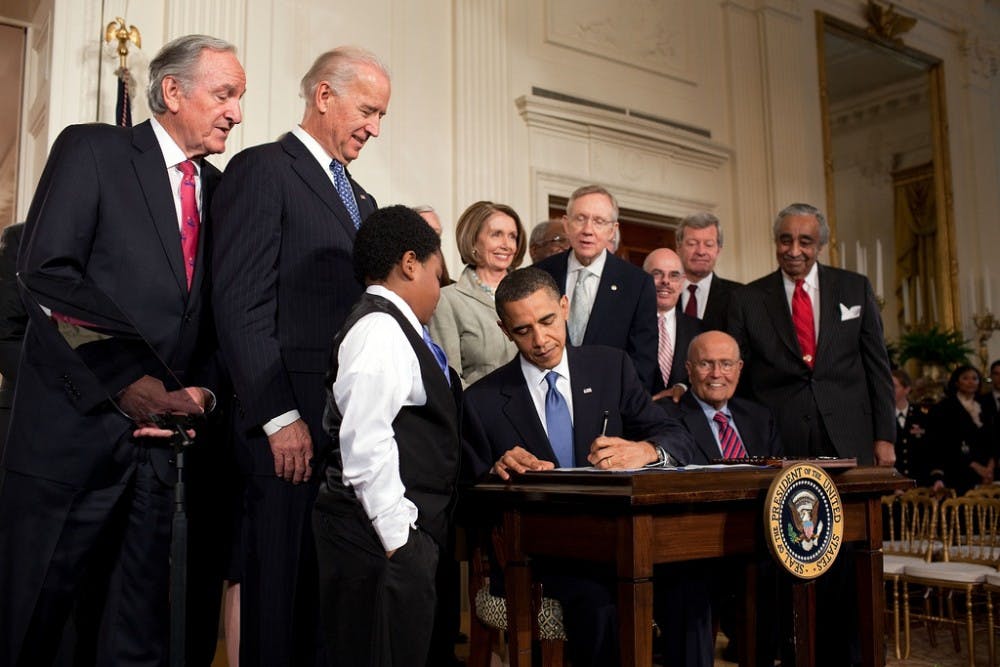President Trump’s first executive order following his Friday inauguration instructed government agencies to alter, delay or waive provisions of the Affordable Care Act — also known as Obamacare — which they deem too costly. For the University Health System and Elson Student Health Center, this shift in policy enforcement will likely have little immediate effect on healthcare and insurance costs.
Republicans have been promising to “repeal and replace” the ACA since it first came to the House floor. Congress has already begun the process of repealing the ACA, voting in both houses to have legislation for the repeal ready by Jan. 27. No legislation for a replacement bill has been proposed as of yet.
The Congressional Budget Office released a report Jan. 17 that illustrated how one pathway to repeal — retaining insurance market reforms but eliminating mandate penalties and subsidies — would leave an additional 18 million people uninsured and increase premiums in the nongroup market by 20 to 25 percent in the following enrollment year.
Larry Fitzgerald, chief financial and business development officer for the Health Center, said they still have three more years of payment reductions in order to meet the $159 million total spending cuts required by the ACA. Since these payment cuts were back-end loaded, $101 million of that total remains to be paid.
“The cuts are in front of us — the ones that really count — so we’re concerned about that,” Fitzgerald said. “We’ve planned for them, we have them in our long-range finance plan, and we are able to accommodate them — but it is a big number.”
The hospital also saw a single percentage point reduction in indigent care — state-subsidized care for patients meeting 200 percent of poverty — since the enactment of the ACA, he said.
Virginia opted out of one aspect of the ACA — expanding Medicaid, a form of government health insurance for the poor. Fitzgerald said the University has a special arrangement that allows them to expand Medicaid regardless of the state’s decision.
One problem with existing health care policy is many Americans fall in between qualifying for Medicaid and being able to afford their own insurance, he said.
“Where we have an issue is if you have someone who makes income greater than 200 percent of poverty and doesn’t have insurance and they’re facing a $100,000 bill,” Fitzgerald said.
With the repeal of the ACA looming, Fitzgerald said it is difficult to prepare until a clear replacement is proposed.
“The problem is this — we don’t know what the Trump administration is gonna do,” he said. “What we think is gonna happen is some of the Republican plans go toward more privatization of insurance.”
Executive Director of Student Health Christopher Holstege said no national policy changes, whatever they may be, will affect student insurance plans until after next academic year.
“We do not anticipate any significant negative impacts on the Student Health services provided to the University of Virginia students and are striving to provide enhanced services while containing costs,” Holstege said in an email statement. “We also do not expect any drastic changes to the Student Health insurance offered by the University and instead anticipate enhanced coverage with decreased cost for next academic year as that has already been negotiated.”
The ACA affected the terms and costs of Student Health insurance plans when it went into effect. Student Health itself is largely immune to national policy changes since the Student Health fee funds most of its services.
Student Health’s pharmacy and laboratory do charge students, but fall under the jurisdiction of the University Health System, not Student Health.
By and large, little is expected to change with regards to healthcare on Grounds this year — for students or the hospital. The longer term repercussions of “repeal and replace,” however, are much less certain.
“It will work out, but we’re playing close attention, very close attention to what occurs,” Fitzgerald said.







